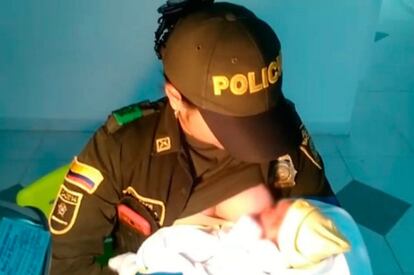Colombian policewoman becomes unlikely hero after breastfeeding abandoned newborn
Luisa Fernanda Urrea hits headlines after “mother’s instinct” prompts her to interrupt her vacation, put on her sister’s uniform and attend to child


In the seven years that Luisa Fernanda Urrea, 28, has worked for the Colombian Police, she has never had to put on a uniform that wasn’t hers. Until January 11, that is, when her sister, who is also on the force, called her for help.
A newborn infant had been found abandoned in Tuluá, a town in the western part of Colombia. The baby girl still had her umbilical cord attached and was showing symptoms of hypothermia.
Urrea, a patrol officer who had given birth herself just 11 months ago, took some time from her vacation leave, put on her sister’s uniform (regulations required her to do so before getting involved in the case), and went to the place where the baby was being looked after so she could nurse her.
¡Ejemplo de vida! Policía amamantó a bebé abandonada en pastizal de Tuluá https://t.co/1413lEpje7
— Noticias Caracol (@NoticiasCaracol) January 12, 2016
The breast-feeding moment was captured by the Caracol television network and soon became a viral sensation on social media. The story was picked up by Buzzfeed, Mashable, The Independent, Spain’s Noticias Cuatro and other news media.
In its tweet, Caracol reported: “An example of life: police officer breastfeeds abandoned baby found in found in a meadow in Tuluá, Valley. The baby, which was born an hour ago, was found wrapped in burlap and discovered by a 59-year-old woman.”
“I never thought that such a simple act would have had such a global impact and much less become one of the most commented stories on social media,” says Urrea, who has become a symbol for those who defend breastfeeding.
“I tried to make her feel that she wasn’t alone, and wanted to give her a little bit of love and affection”
Urrea, who is still feeding her own child, says it “was a miracle” that she was on vacation in Tuluá and not in Pereira, where she lives.
“We were here with my baby for a few days of rest, and I didn’t have my regular uniform,” she explains. “But things happen and I believe maternal instinct, which I still have intact, meant I didn’t have to think twice about what I was going to do.”
The following day, the baby was taken to the Tomás Uribe Hospital in Tuluá.
about verne
Urrea explains that she tried to breastfeed her a second time but could not get access to the child. “I tried to make her feel that she wasn’t alone, and wanted to give her a little bit of love and affection,” she says. The baby had been in contact with a well and had contracted an infection. As such only health professionals could come into contact with her.
When she got home she says saw her own baby in a different light. “You would never think that something so common as breastfeeding could save a life, but I proved that it could.” she explains.
The infant will receive treatment while authorities try to find her mother. If no family member can be found, she will be taken to Colombia’s Institute for Family Welfare, where she will be put up for adoption.
English version by Martin Delfín.
Tu suscripción se está usando en otro dispositivo
¿Quieres añadir otro usuario a tu suscripción?
Si continúas leyendo en este dispositivo, no se podrá leer en el otro.
FlechaTu suscripción se está usando en otro dispositivo y solo puedes acceder a EL PAÍS desde un dispositivo a la vez.
Si quieres compartir tu cuenta, cambia tu suscripción a la modalidad Premium, así podrás añadir otro usuario. Cada uno accederá con su propia cuenta de email, lo que os permitirá personalizar vuestra experiencia en EL PAÍS.
¿Tienes una suscripción de empresa? Accede aquí para contratar más cuentas.
En el caso de no saber quién está usando tu cuenta, te recomendamos cambiar tu contraseña aquí.
Si decides continuar compartiendo tu cuenta, este mensaje se mostrará en tu dispositivo y en el de la otra persona que está usando tu cuenta de forma indefinida, afectando a tu experiencia de lectura. Puedes consultar aquí los términos y condiciones de la suscripción digital.








































